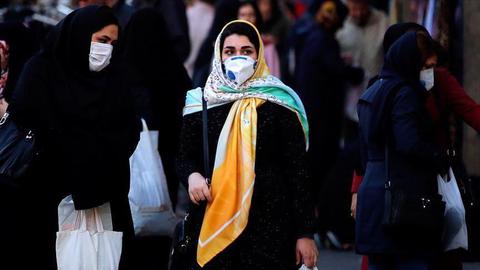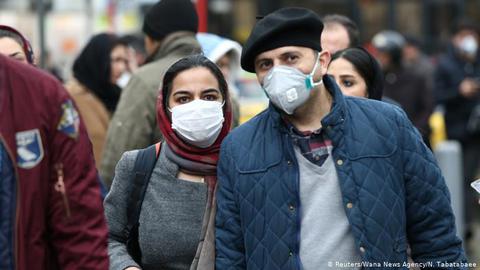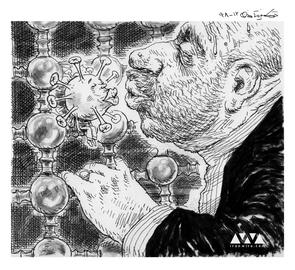A woman sits behind the cash register, wearing white overalls, talking with her friend. “Believe me, I could have sold the masks for four times that price but I felt sorry for people and sold them at twice the price.” Her friend looks at her angrily and tells her: “Feel sorry for yourself. Which of these people gave a damn about you when you sold your car and jewelry to invest in this pharmacy? The time for such talk is over.”
A few blocks down the street at another pharmacy, a young woman who appears to be the owner talks on the phone. She is arguing with the distributor of a disinfectant spray. “I am not going to buy from you at this price,” she shouts down the phone. “I will tell people how to make it.” She hangs up and, although she still has a few bottles of spray left on the shelf, she tells the customers, “these sprays are nothing but water and alcohol. Fill one-fifth of any container with medical alcohol and four-fifths with water. Profiteers deserve it when people refuse to buy.”
Nima, a resident of Tehran, says, “Today, Tuesday, February 25, I went to more than 10 pharmacies in west Tehran to buy alcohol or disinfectant. At last I found a small bottle of medical alcohol for 35,000 tomans [over US$8]. Most big pharmacies have written on their windows that they are out of masks, alcohol, disinfectants, and so on.”
But it is not just the shortage of masks, disinfectants and alcohol people have to worry about. The spread of coronavirus has impacted every aspect of their lives.
Sohrab works for a headscarf shop in a mall in affluent northern Tehran. “This week six stores in our mall canceled their leases and four did not even open at the beginning of the week,” he says. “The market is nothing like it used to be on the eve of the new year. Every year at this time we did not even have time to take money off our customers we were so busy, but now everywhere is deserted. It usually takes me 45 minutes to drive from the mall to my home. As new year approaches, it usually takes up to one hour and 10 minutes, but these days the streets are so deserted that I have even reached home in just 20 minutes.”
Mina is an employee of a private import-export company. “They closed the office on Monday, February 24, and told us that it would stay closed until further notice,” she says. “They also told us that if somebody wants to leave or finds another job it was all right with them. Our company imports coffee and cacao powder from Brazil and exports our own brand of packaged saffron and pistachios to France and a few other European countries. With all the problems that we have had to deal with over the last few years in the business of export-import, especially the export of food items, our company, thank God, did its work and the results were satisfactory. But for close to two weeks we have not received any new orders and even previous orders that were ready to ship have been canceled. In less than a month the company has moved to the verge of bankruptcy.”
Nightmares of Coronavirus
“Today I did all my shopping, from meat and chicken to beans and detergent,” says Rosa, who lives with her five-year-old son Armin. “I want to go home and not leave home until April 3 [after the Iranian new year holiday]. I have this nightmare every night that my son has been infected with coronavirus and my heart goes to pieces.” She says people around her keep advising her to keep calm. “My sister talks to me a lot. ‘Why are you doing this?’ she tells me. ‘Why are you making a mountain of a molehill? Coronavirus is a virus like the flu and, in the worst-case scenario, the chances of dying from it is three percent.’ This reminds me of a joke that I read on the web: ‘The chance of being born in Iran was one percent, but we were born in Iran anyhow.’”
Hossein works for Hotel Dariush on the Persian Gulf island of Kish. “I have been working here for three years and every year we were booked solid from late January for the [Iranian new year] holidays,” he says. “But this year we have many empty rooms and many of the travelers who had booked rooms in January have canceled their reservations. Their main reason is that they say Kish is full of Chinese people. The number of layoffs at the hotels has increased a lot and many retailers are thinking of leaving the island. The malls are mostly deserted.”
Run Away if you see Chinese People
Hossein says that people are now living in constant terror of coronavirus. “A Chinese engineer who works for a big construction project on Kish is a guest in our hotel,” he tells us. “Yesterday he told the manager of the hotel that one of his colleagues on the project who works at their Tehran office — they came to Iran from China together — takes the metro to work every day. Four days ago, when he got on the train, two women screamed and ran away. And when he sat down, the two passengers on either side of him got up immediately. The train was very crowded but the two seats remained empty until the end of the trip. He says that he has been in Iran for the last year and that they have not visited China during this time.”
Many Iranians blame Mahan Air for not canceling its flights to China. In a video posted online, former TV host Mahmoud Shahriari repeats the claim by Bahram Parsaei, member of the parliament from Shiraz, who has accused Mahan Air of being the main culprit in bringing coronavirus to Iran because it put its profits first and continued to take Chinese passengers to and from China. In front of the camera, Shahriari tears up three Mahan Air “Preferred Customer” cards that belonged to him and his family and announces: “I will never use the services of this airline as long as I live.”
A significant number of experts have recommended that cities such as Tehran and Qom be quarantined but on Monday, February 24, in a joint news conference with the government spokesman Ali Rabiei, Deputy Health Minister Iraj Harirchi announced: “I am against quarantining [cities]. Quarantine belongs to the time before the First World War. We do tests, we analyze and make predictions about coronavirus and then study the consequences of our decisions. Quarantining has many [adverse] consequences and I am completely against it.” The next day, however, it was reported that he himself had contracted coronavirus. He posted a video announcing the news and said that he was quarantining himself.
A few hours later, Mahmoud Sadeghi, member of parliament from Tehran, also posted a video saying he had tested positive for the virus. But some on social media have questioned the veracity of these reports.
“We are dealing with a government that tries to use, or rather abuse, any tool at its disposal for its own benefit,” says Alireza, a political science Master’s student. “It is not inconceivable that a government that easily shoots protesters, that hides the fact that it fired a missile at a passenger plane and then calls the passengers that it has killed ‘martyrs’ but confiscates their bodies, would use coronavirus as well. If nothing else, we know that they concealed the outbreak of coronavirus in Iran. Figures cited by officials and by the representatives of various cities to the parliament do not match. People no longer believe anything that the officials say — even if they say they are sick.”
Related Coverage:
Exclusive: Revolutionary Guards Force Health Officials to Keep Coronavirus Numbers Secret, 26 February 2020
Athletes Condemn Government’s Decision to Hold Sports Competitions, 26 February 2020
While the Government Was in Denial, She Contracted Coronavirus and Died, 26 February 2020
How Did Iran’s Religious Center Become the Country’s Coronavirus Epicenter?, 25 February 2020
Quarantine or Public Prayers? That is the Question in Iran, 25 February 2020
Iran's Deputy Health Minister has Contracted Coronavirus, 25 February 2020
Reports of Coronavirus in Three Iranian Prisons, 25 February 2020
Students Call for University Closure Until Norooz, 24 February 2020
Iranian Medical Professionals Confess They Are not Prepared to Handle Coronavirus, 24 February 2020
visit the accountability section
In this section of Iran Wire, you can contact the officials and launch your campaign for various problems


























comments